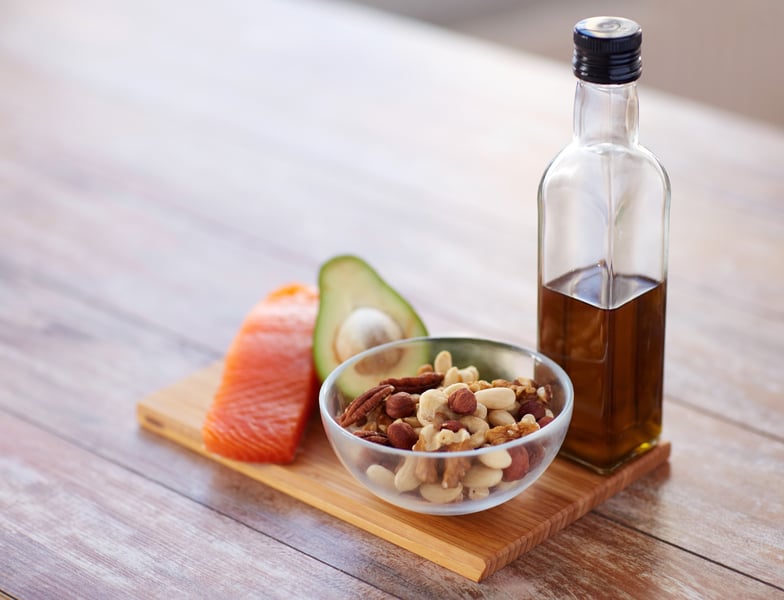Get Healthy!

- Kirstie Ganobsik
- Posted February 14, 2023
5 Foods to Boost Your Heart Health
Keeping your heart healthy has numerous benefits, including a reduced risk for coronary heart disease, stroke, heart attack and even dementia.
Eating healthy foods is one big step you can take to protect your heart, but most folks wait too long to change what they eat.
"Many people ignore their diet until they develop cardiovascular symptoms later in life. Adopting a heart-healthy diet when you are young can help you live longer and healthier,"Loyola University Medical Center cardiologist Khaled Dajani said in a recent blog post.
In its 2021 Dietary Guidance Scientific Statement, the American Heart Association (AHA) recommends eating foods from the Mediterranean, Healthy US-Style and DASH (Dietary Approaches to Stop Hypertension) diets for heart health. These include:
- Dark leafy greens
- Whole grains
- Fish
- Nuts
- Plant-based oils
- Whole fruits
- Lean meats
- Beans and legumes
Let's take a look at five of the best foods for heart health from these categories, and how to easily add them to your diet.
Olive oil
Olive oil contains the highest percentage of monounsaturated fat, which is great for your heart, according to the AHA. It helps lower LDL ("bad") cholesterol and raise HDL ("good") cholesterol. You'll want to keep portions between 1 to 3 tablespoons a day, as olive oil is high in fat.
Ways to enjoy olive oil:
- Dip whole-wheat bread into olive oil instead of using butter.
- Toss pasta in a light mix of olive oil, pepper, and a tablespoon of Parmesan cheese in place of creamy sauces.
- Ditch store-bought dressings and make a mix of olive oil, vinegar, pepper, garlic powder and onion powder for your greens.
Quinoa
Quinoa is a fiber-rich, gluten-free grain from South America that contains antioxidants and all nine essential amino acids, according to the U.S. National Institutes of Health (NIH). Antioxidants and amino acids help protect and repair cells and reduce the risk of disease. Plus, fiber may lower cholesterol and blood pressure, states Harvard Health.
One meta-analysis of studies published recently in the Phytotherapy Research Journal showed that eating quinoa lowered people's body weight, LDL levels, and several other key cardiovascular disease risk factors. The AHA recommends eating at least three servings of whole grains like quinoa per day.
Ways to enjoy quinoa:
- Mix quinoa with black beans to make a protein-rich burger.
- Add the grain into soups in place of noodles or rice.
- Create a next-level salad by combining quinoa with your favorite vegetables.
- Add cinnamon, honey and peaches to the grain for a delicious (and nutritious) oatmeal alternative.
Black beans
Black beans are high in fiber, which helps your body maintain healthy cholesterol levels and reduces your risk of heart disease, according to the U.S. Centers for Disease Control and Prevention. They are also nutritionally dense and high in protein, which is why they're sometimes referred to as a "superfood." The U.S. Department of Agriculture (USDA) recommends eating about 1 to 3 cups of beans per week. Lower salt varieties can be especially beneficial for heart health.
Ways to enjoy black beans:
- Swap out beef for low-fat black beans in all your favorite dishes.
- Add them to quinoa for a protein-dense meal.
- Mix them into fruit and vegetable-based salsa and dips for some added fiber.
Walnuts
Walnuts contain an abundance of alpha-linolenic acid, which is converted into certain types of omega-3 fatty acids in the body, according to Harvard Health. Omega-3 fatty acids help protect your heart health in a number of ways, including lowering triglyceride fats in your body.
In addition, a study published recently in the Journal of the American College of Cardiology found that eating walnuts regularly for two years reduced a key inflammatory marker that's associated with coronary heart disease. Since walnuts are high in calories, try to limit your portion size to less than one cup per week.
Ways to enjoy walnuts:
- Top off your favorite desserts with a handful of walnuts.
- Mix them into fruit salads for some added crunch.
- Finely chop walnuts and use them to coat your favorite lean or plant-based meat.
Salmon
Salmon not only contains heart-healthy omega-3 fatty acids, but this pink fish also has plenty of vitamin B6, which helps keep an amino acid called homocysteine in balance for optimal heart health.
Salmon is also low in saturated fat, and the AHA recommends eating two (3-ounce) servings per week to help lower your risk for cardiovascular disease and stroke.
Ways to enjoy salmon:
- Cook it in olive oil with a squirt of mango juice.
- Top it with teriyaki sauce and serve it over quinoa.
- Bake it with lemon juice, minced garlic and cilantro for a tasty dish.
To help keep your heart healthy, Dajani emphasizes that correct portion size is also very important. "Even when you eat healthy foods, it's important not to overeat,"he said. "Knowing what and how much to eat is a skill everyone should learn."
You can find out more about the best foods for heart health in the 2020-2025 USDA Dietary Guidelines for Americans.


